This article needs additional citations for verification .(May 2021) |

Otto Ullrich (1894-1957) [1] was a German pediatrician who identified and named Ullrich syndrome.
This article needs additional citations for verification .(May 2021) |

Otto Ullrich (1894-1957) [1] was a German pediatrician who identified and named Ullrich syndrome.
After Otto Ullrich studied medicine in Munich, he served as an assistant physician in the medical corps during World War I. Following the war, he worked at the Ludwig-Maximilians-Universität München; with the chairman of pediatrics, professor Meinhard von Pfaundler (1872-1947). Ullrich was influenced by Pfaundler in his interest in medical genetics. [2]
In 1922 Ullrich served as director of the policlinic and in 1929 achieved faculty status. In 1934 he moved to Berlin as director of the National Centre to Combat Infant Mortality, a post for which knowledge of human genetics was a prerequisite. Ullrich, however, did not enjoy working under the political atmosphere in Berlin, and after six months, he shifted to Essen, as director of the Municipal Children's Hospital. In 1939 Ullrich was called to the chair of paediatrics at Rostock and in 1943 he took up the position in Bonn, where he remained until his death in 1957. [1]
Ullrich's achievements were honoured for excellence in medical genetics in 1991 by the establishment of the Otto Ullrich medal. The creation of this award was announced in the American Journal of Medical Genetics , in an edition which contained an editorial and several articles pertaining to Ullrich and his scientific achievements. [2]
Hans-Rudolf Wiedemann, professor emeritus of the University of Kiel and Ullrich's former chief resident, rendered this account of his mentor's professional and personal attributes: [1]
As physician, Ullrich was very broad based. At the bedside he was patient and was quickly to win the trust of the child. He examined very calmly and was an excellent observer with a capacity to take in the essentials of the case at a glance. The laboratory data were reviewed routinely but were never overemphasised, quite in the highly critical and analytical Munich spirit. His special ability to retain and to recall previous cases allowed Ullrich to make correct diagnoses with surprising ease. His rounds were as punctual as clockwork and very thorough, offering a wealth of information and experienced counsel, enriched by his critical perspective and pronounced distaste against hastiness, especially in therapy. This was not only a result of his Munich background but also reflected his personal inclination. [1] [2] As a human being Otto Ullrich had a gracious and noble personality, with a compelling glance and a care for moderation and compromise. Apart from professional contacts, Ullrich could be reserved with younger co-workers; however, when he was able to open himself to others he always engendered much joy." [1]

Theodor Escherich was a German-Austrian pediatrician and a professor at universities in Graz and Vienna. He discovered and described the bacterium Escherichia coli.

Ferid Murad is an Albanian-American physician and pharmacologist, and a co-winner of the 1998 Nobel Prize in Physiology or Medicine. He is married to Carol A. Murad with whom he has five children and nine grandchildren.

Lionel Sharples Penrose, FRS was an English psychiatrist, medical geneticist, paediatrician, mathematician and chess theorist, who carried out pioneering work on the genetics of intellectual disability. Penrose was the Galton professor of eugenics (1945–1963), then professor of human genetics (1963–1965) at University College London, and later emeritus professor.
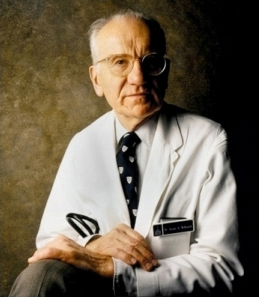
Victor Almon McKusick was an American internist and medical geneticist, and Professor of Medicine at the Johns Hopkins Hospital, Baltimore. He was a proponent of the mapping of the human genome due to its use for studying congenital diseases. He is well known for his studies of the Amish. He was the original author and, until his death, remained chief editor of Mendelian Inheritance in Man (MIM) and its online counterpart Online Mendelian Inheritance in Man (OMIM). He is widely known as the "father of medical genetics".
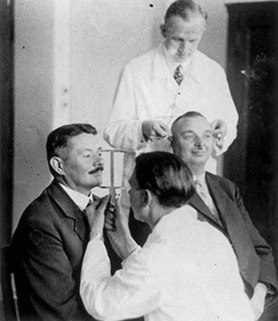
Otmar Freiherr von Verschuer was a German human biologist, national socialist, and geneticist, who was the Professor of Human Genetics at the University of Münster until he retired in 1965. A member of the Dutch noble Verschuer family, his title Freiherr is often translated as baron.
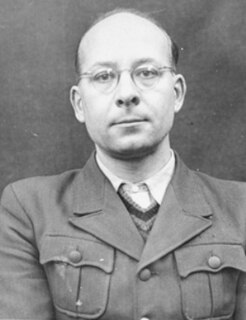
Helmut Poppendick was a German doctor who served in the SS during World War II. He was an internist and worked in the Medical Doctorate, as Chief of the Personal Staff of the Reich Physician SS and Police. After the war he was a defendant in the Doctors' Trial.

Karl Franz Gebhardt was a German medical doctor and a war criminal during World War II. He served as Medical Superintendent of the Hohenlychen Sanatorium, Consulting Surgeon of the Waffen-SS, Chief Surgeon in the Staff of the Reich Physician SS and Police, and personal physician to Heinrich Himmler.

Otto Müller was a German painter and printmaker of the Die Brücke expressionist movement.
Oswaldo Frota-Pessoa was a noted Brazilian physician, biologist and geneticist.
Axel Ullrich is a German cancer researcher and has been the director of the molecular biology department at the Max Planck Institute of Biochemistry in Martinsried, Germany since 1988. This department's research has primarily focused on signal transduction. Ullrich has received Hamdan Award for Medical Research Excellence, awarded by Sheikh Hamdan bin Rashid Al Maktoum Award for Medical Sciences, Dubai, United Arab Emirates in 2008 and Ullrich and his team received the Wolf Prize in 2010.
Frank Clarke Fraser was a Canadian medical geneticist. Spanning the fields of science and medicine, he was Canada's first medical geneticist, one of the creators of the discipline of medical genetics in North America, and laid the foundations in the field of Genetic Counselling, which has enhanced the lives of patients worldwide. Among his many accomplishments, Fraser pioneered work in the genetics of cleft palate and popularized the concept of multifactorial disease. Fraser is an iconic figure in Canadian medicine, as well as a biomedical pioneer, a fine teacher, and an outstanding scientist.

Bruce R. Korf is a medical geneticist at the University of Alabama at Birmingham. In April 2009, he began a two-year term as president of the American College of Medical Genetics (ACMG), a professional organization.
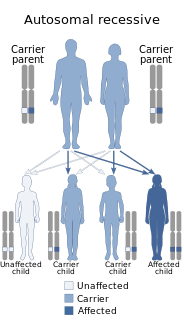
Ullrich congenital muscular dystrophy is a form of congenital muscular dystrophy. It is associated with variants of type VI collagen, it is commonly associated with muscle weakness and respiratory problems, though cardiac issues are not associated with this type of CMD. It is named after Otto Ullrich, who is also known for the Ullrich-Turner syndrome.

Andrea Prader was a Swiss scientist, physician, and pediatric endocrinologist. He co-discovered Prader–Willi syndrome and created two physiological sex development scales, the Prader scale and the orchidometer.
Meinhard von Pfaundler ; was an Austrian pediatrician born in Innsbruck. He was the son of Leopold Pfaundler.
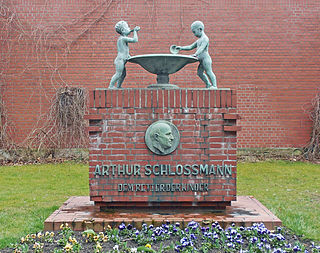
Arthur Schlossmann was a German pediatrician and social public health specialist.
Arno Gunther Motulsky was a professor of medical genetics and genome sciences at the University of Washington. Through his research, writing and mentoring, he helped create and define the field of medical genetics. He is also known as the "father of pharmacogenomics" based on his report in 1957 of negative drug responses in some patients depending upon their genetics at critical enzymes.[2]

Michael Joseph Rossbach was a German clinician and pharmacologist.
Otto Hermann Krayer was a German-American physician, pharmacologist and university professor.
Charis Eng, M.D., Ph.D., is a Singapore-born physician-scientist and geneticist at the Cleveland Clinic, notable for identifying the PTEN gene. She is the Chairwoman and founding Director of the Genomic Medicine Institute of the Cleveland Clinic, founding Director and attending clinical cancer geneticist of the institute’s clinical component, the Center for Personalized Genetic Healthcare, and Professor and Vice Chairwoman of the Department of Genetics and Genome Sciences at Case Western Reserve University School of Medicine.